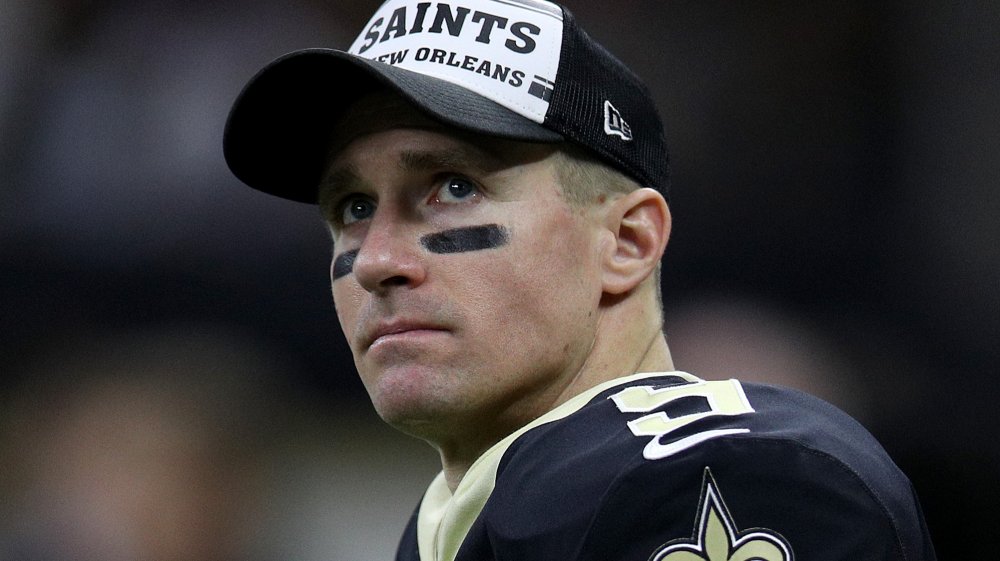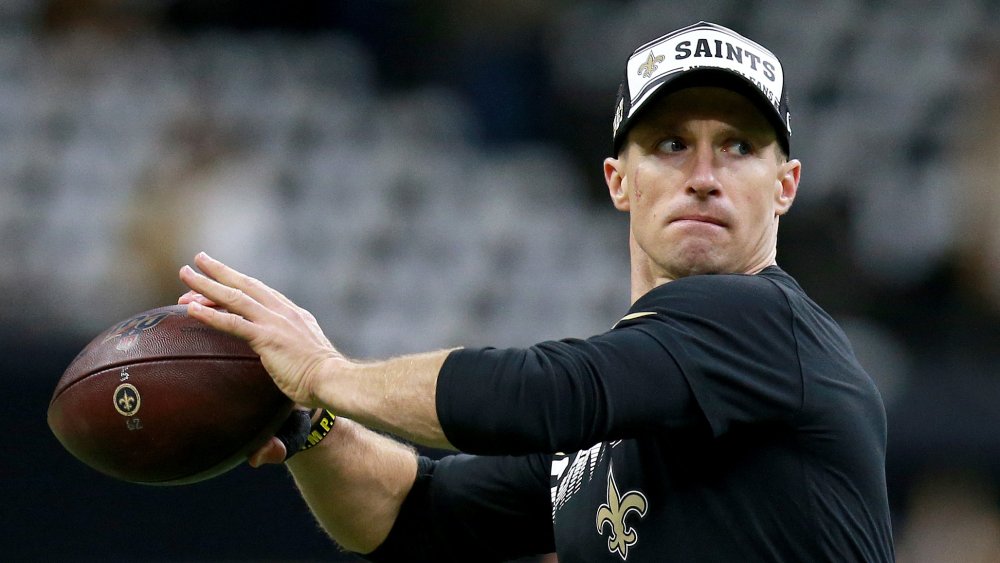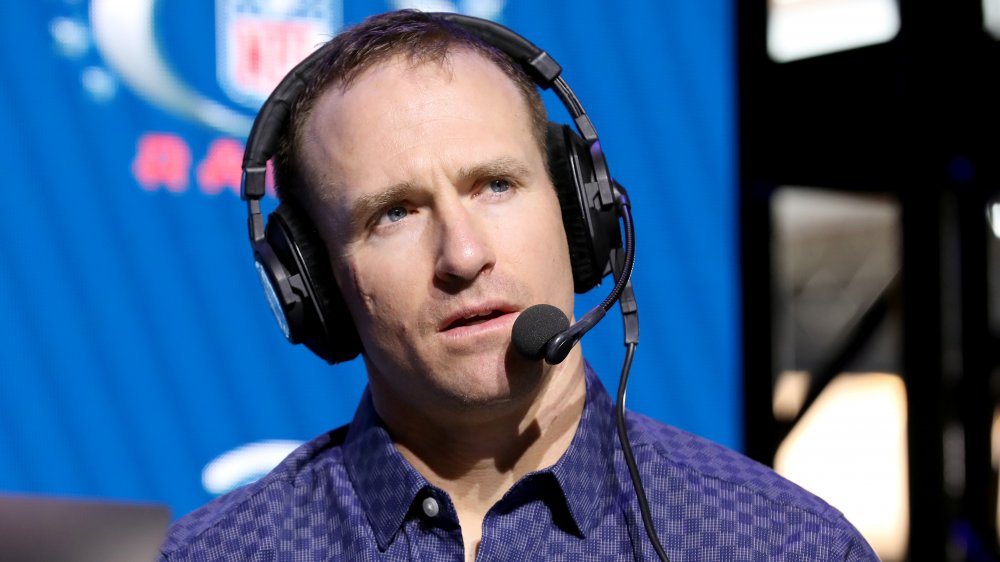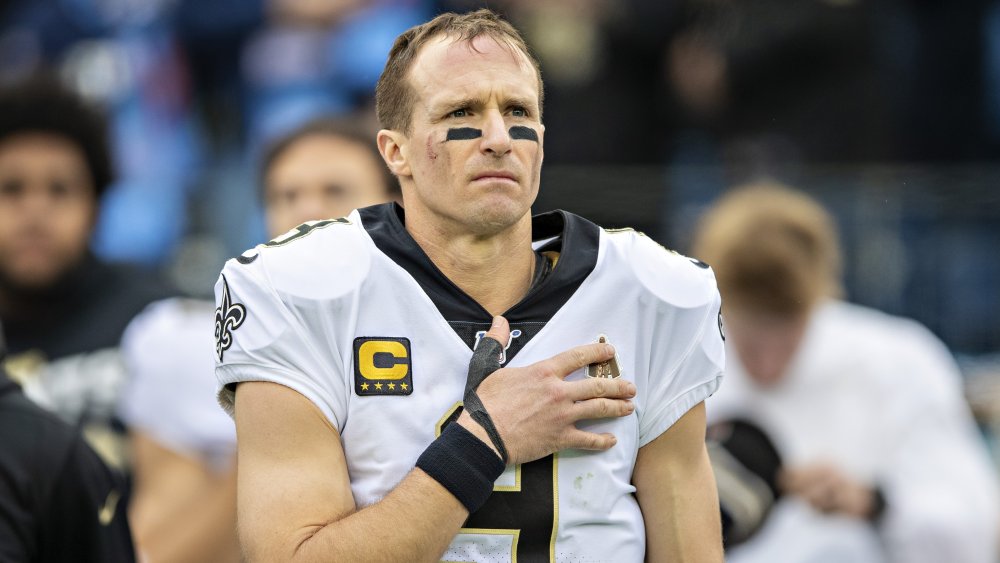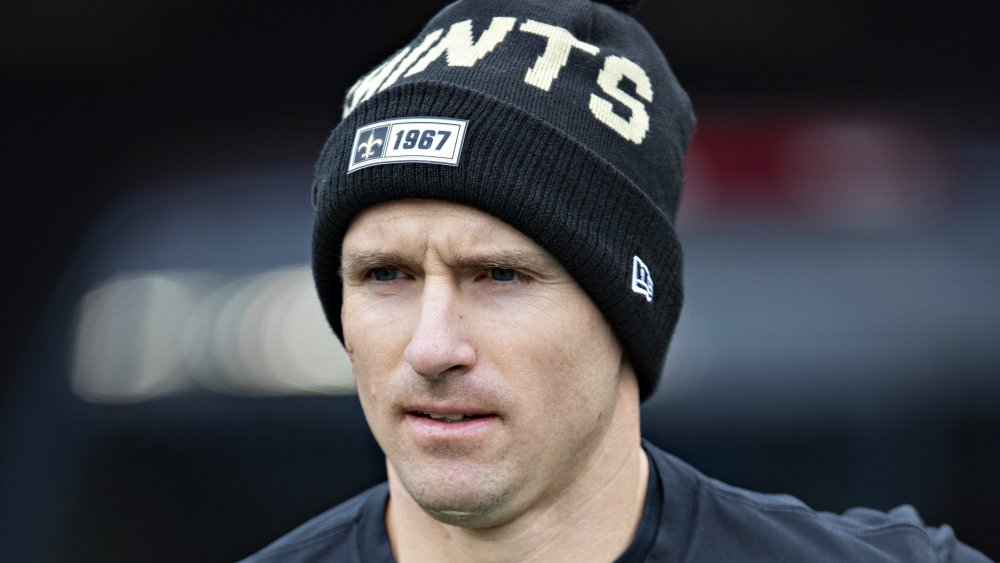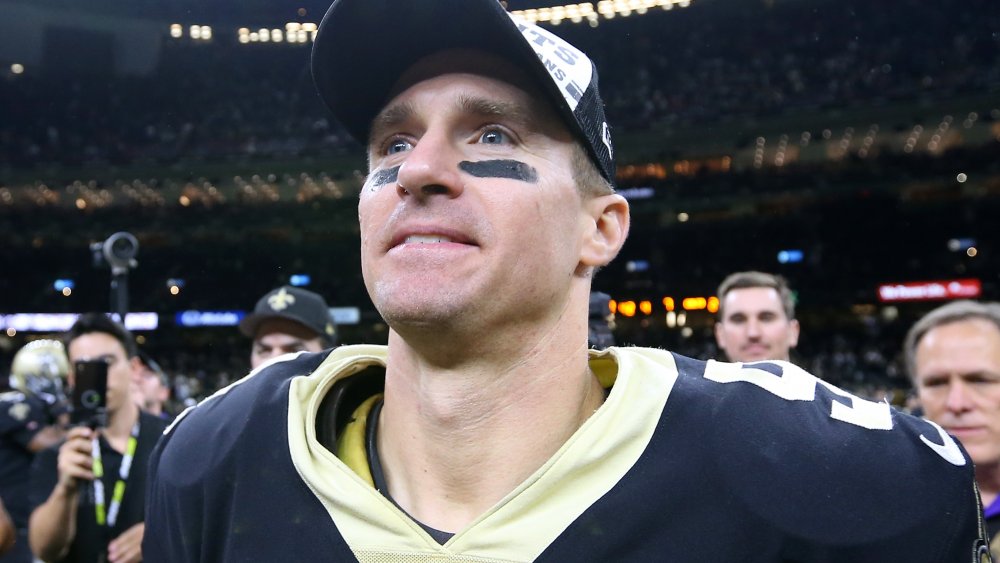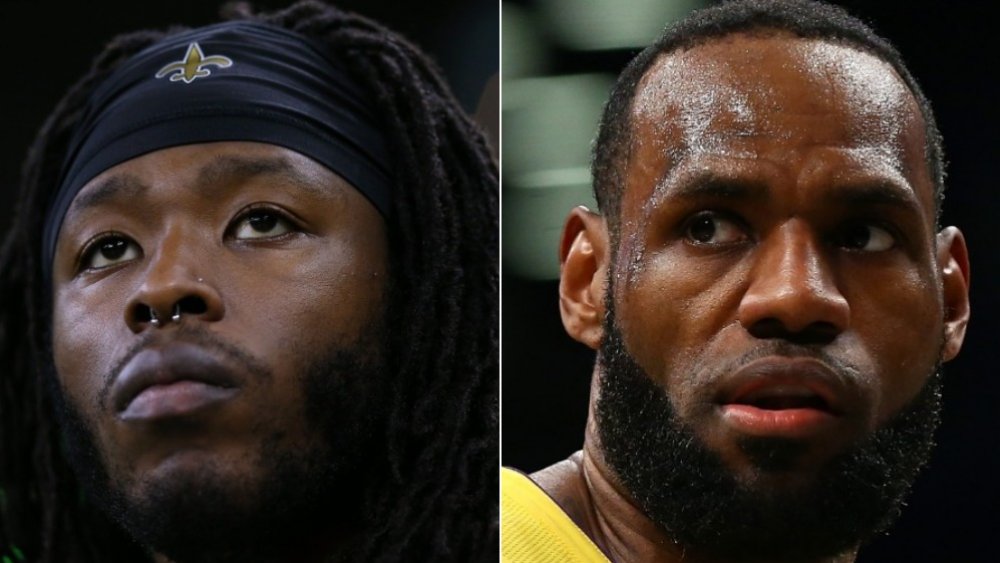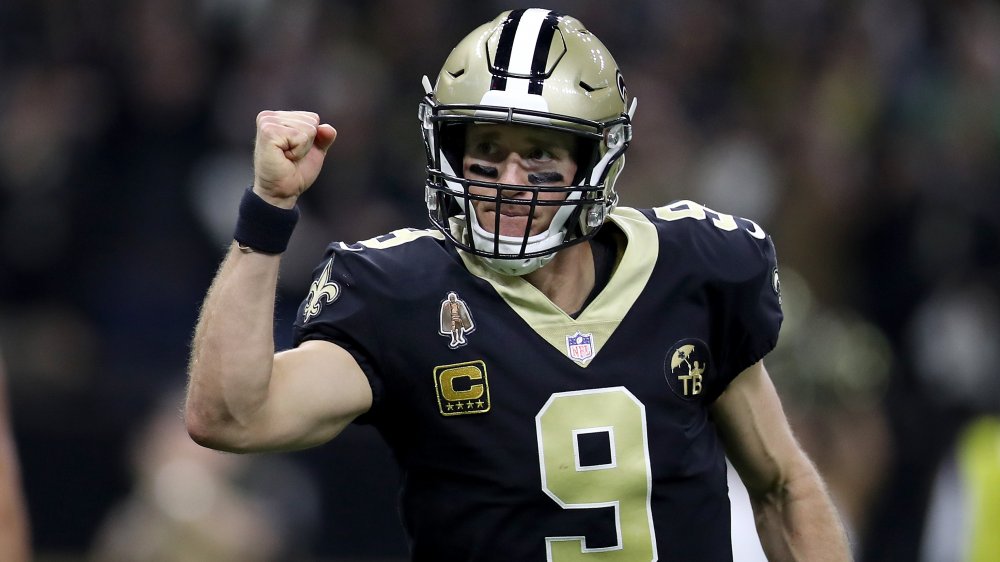The Shady Truth About Drew Brees
There can be no denying New Orleans Saints quarterback Drew Brees' performance on the field. Selected by the San Diego Chargers in the second round of the 2001 NFL Draft, Brees is solidly in the conversation of one of the greatest to play the position. During his 19-year legendary career, Brees became a 13-time Pro Bowler, Super Bowl champion, and the all-time NFL leader in passing yards, completions, and touchdowns.
That's quite the career for a man who many thought would never play football again after a devastating shoulder injury that almost destroyed his rotator cuff in 2005. But after the Chargers let him go in favor of Phillip Rivers, Brees became a folk hero in the city of New Orleans.
Off the field? That's another story, with one huge controversy in particular potentially tainting Brees' "nice guy" image forever. Huddle up, and let's find out the shady truth about Drew Brees.
Drew Brees' business practices have raised eyebrows
During his record-setting NFL career, Drew Brees has earned a whopping $244.7 million, as of this writing. However, it seems he wants to earn more — but allegedly not in the most savory of ways. According to SB Nation's Canal Street Chronicles, Brees' "unsavory and borderline diabolical business practices" have come under a microscope.
In one instance, Brees and his wife publicly supported Mitt Romney's "distant cousin" in an apparent gentrification project on New Orleans' historic Magazine Street in 2011. The neighborhood was not on board at all with the plans for a three-story yoga studio, Nola.com reported, with critics calling the "imposing structure" an "eyesore" that would exacerbate the already problematic traffic in the area. Brees even name-checked the place in a supportive tweet, calling it "1 of the great small businesses in Nola." And at the Board of Zoning Adjustments meeting to address neighborhood outcry, Brees' wife argued that the structure didn't need to meet the required parking variances because ... she would ride her bike there.
Another Brees-related development project that scandalized The Big Easy was when star QB joined a group of private donors in an attempt to build a $4 million kids soccer complex on a coveted piece of city-owned waterfront property in Audubon Park known as The Fly. According to 4WWL, critics of the project cited a "lack of public input" over the use of the space and accused the developers of "trying to cut a backroom," deal. Despite Bree's continued support in the face of public outcry, the project was ultimately shelved.
Was Drew Brees the face of a pyramid scheme?
In 2010, Drew Brees became the national spokesman for AdvoCare International, a multilevel marketing company that sells energy drinks, shakes, and supplements directly to consumers. According to an ESPN report, Brees cut numerous ads for the company and extolled its products. However, the company's business model allegedly prioritized "recruiting other distributors," with individual distributors required to "infuse the company with new funds" in order to make money.
"It nauseates me to think of the people who spent $3,000 and didn't make a dime because they believed me — and the goal, and the dream," a former distributor said. "You catch people in a bad spot who maybe have hope that this could be a way for them to pay for their credit card and their kids, and you exploit them. That's the bottom line." However, Brees continued to promote the company. "I have literally NEVER had a single person come up to me and say anything negative about AdvoCare products or the business model,' he said, adding, "I see the lives that it changes, not only as a direct result of taking the products but the financial independence it gives many of its distributors."
The Federal Trade Commission saw it differently, and in 2019, determined that the "business model was a pyramid scheme." In its report, the FTC determined that 72% of AdvoCare's distributors either "lost money or earned nothing." The company agreed to pay a $150 million fine to no longer operate a multi-level marketing business.
Did Drew Brees misunderstand Colin Kaepernick's protest?
During a 2016 preseason NFL game, while he was a member of the San Francisco 49ers, quarterback Colin Kaepernick was seen sitting down during the national anthem. "I am not going to stand up to show pride in a flag for a country that oppresses black people and people of color," Kaepernick told NFL Media in an exclusive interview after the game. "To me, this is bigger than football and it would be selfish on my part to look the other way. There are bodies in the street and people getting paid leave and getting away with murder."
By the next game, after a conversation with former Green Beret Nate Boyer, Kaepernick started to kneel during the national anthem to bring awareness to police brutality. He also "donate[d] $1 million to groups that help people affected by the issues he is trying to spotlight" (via USA Today). Inspired by Kaepernick, many more NFL players began kneeling during the anthem, but their silent protest became a divisive cultural issue in America. Among the players not taking a knee? Drew Brees.
"I disagree. I wholeheartedly disagree," Brees told ESPN. "Not that he wants to speak out about a very important issue. ... But there's plenty of other ways that you can do that in a peaceful manner that doesn't involve being disrespectful to the American flag." It seems Brees, along with many other detractors missed the point of what Kaepernick was trying to say.
How did a PSA get Drew Brees labeled anti-LGBTQ+?
In 2019, Drew Brees appeared in a video promoting "Bring Your Bible to School Day," an initiative by the religious group Focus on the Family — an organization labeled "anti-LGBTQ+" by Big Easy Magazine. After backlash, Brees released a Twitter video attempting to distance himself from the organization. He claimed it was a misrepresentation to say that he was "aligned with an organization that was anti-LGBTQ," and that that while he lives by "Christian fundamentals," just because he appeared in the organization's video doesn't mean he agrees with their homophobic stance.
"What I did was I filmed a video recently that was encouraging kids to bring their bibles to school for national Bring Your Bible to School Day," he continued. "To bring your bibles to school to be able to live out your faith with confidence, and I even gave one of my favorite bible verses. It was as simple as that."
However, according to Advocate, Focus on the Family's founder publicly called for "killing trans people who use restrooms associated with their gender identity," and the group has endorsed the controversial and dangerous practice of conversion therapy. Brees defended himself again while speaking with reporters, saying, "I was not aware of any of the things said about them lobbying antigay, hate type of messaging, or inequality, or any type of hate type-related stuff. ... It was not promoting any group, certainly not promoting any group that was associated with that type of behavior."
Drew Brees' response to George Floyd's death was met with instant backlash
In the wake of George Floyd's death following a brutal altercation with four Minneapolis police officers, several NFL stars (including Drew Brees' teammate and favorite target, wide receiver Michael Thomas), united to record a message asking the league to "condemn racism" and do more to fight against it (via Bleacher Report). Drew Brees, on the other hand, did not do that.
During an interview with Yahoo! Sports, Brees once again brought up the flag and the national anthem when asked if he would support any players who chose to kneel in protest again once the season started. "I will never agree with anybody disrespecting the flag of the United States of America or our country," he said, adding, "Let me just tell what I see or what I feel when the national anthem is played and when I look at the flag of the United States. I envision my two grandfathers, who fought for this country during World War II, one in the Army and one in the Marine Corp." We assume Brees has black teammates whose grandfathers also served.
Brees' comments were met with instant backlash, including from Michael Thomas. "He don't know no better," the NFL's 2019 Offensive Player of the Year tweeted. "We don't care if you don't agree and whoever else how about that," he continued. The pile-on continued...
Drew Brees' teammates and other athletes struck back
Once Drew Brees' comments regarding the national anthem started to light up social media, professional athletes from around the country offered up stark rebukes for the future Hall of Fame quarterback. In a multi-tweet thread, New Orleans Saints star running back and Brees' teammate Alvin Kamara shared his experiences with racism in America from being both black and an undocumented immigrant. "I can kneel confidently because I know that with just that small gesture, a much bigger message is being conveyed. And also within that gesture, the voices of those who no longer have a voice can be heard," he concluded the thread.
Brees' former teammate Malcolm Jenkins called the quarterback's comments "extremely self-centered" in a now-deleted social media video (via ESPN). "Our communities are under siege, and we need help," Jenkins said, adding, "We're done asking, Drew. ... And it's unfortunate because I considered you a friend. I looked up to you. You're somebody who I had a great deal of respect for. But sometimes you should shut the f*** up."
Los Angeles Lakers star LeBron James didn't hold back either, tweeting: "WOW MAN!! Is it still surprising at this point. Sure isn't! You literally still don't understand why Kap was kneeling on one knee?? Has absolute nothing to do with the disrespect of and our soldiers (men and women) who keep our land free. My father-in-law was one of those men who fought as well for this country."
Was Drew Brees' apology sufficient?
A day after Drew Brees faced intense backlash, he posted a lengthy statement to his Instagram account admitting that he was "sick" over "he way my comments were perceived." He continued, "I would like to apologize to my friends, teammates, the City of New Orleans, the black community, NFL community, and anyone I hurt with my comments yesterday. In speaking with some of you, it breaks my heart to know the pain I have caused."
He explained that centering his solidarity argument around "the American flag and the national anthem" was an attempt at unity that fell flat. "[The comments] lacked awareness and any type of compassion or empathy. Instead, those words have become divisive and hurtful and have misled people into believing that somehow I am an enemy. This could not be further from the truth, and is not an accurate reflection of my heart or my character," Brees' statement continued.
"I stand with the black community in the fight against systemic racial injustice and police brutality and support the creation of real policy change that will make a difference.
I condemn the years of oppression that have taken place throughout our black communities and still exists today," the Super Bowl XLIV winner explained, admitting that he himself had "not done enough to fight" for true equality in America. "I have ALWAYS been an ally, never an enemy," he concluded.
Can Brees' apology rehabilitate his public image? According to New York Post columnist Mark Cannizzaro, Brees still "has a long way to go."

